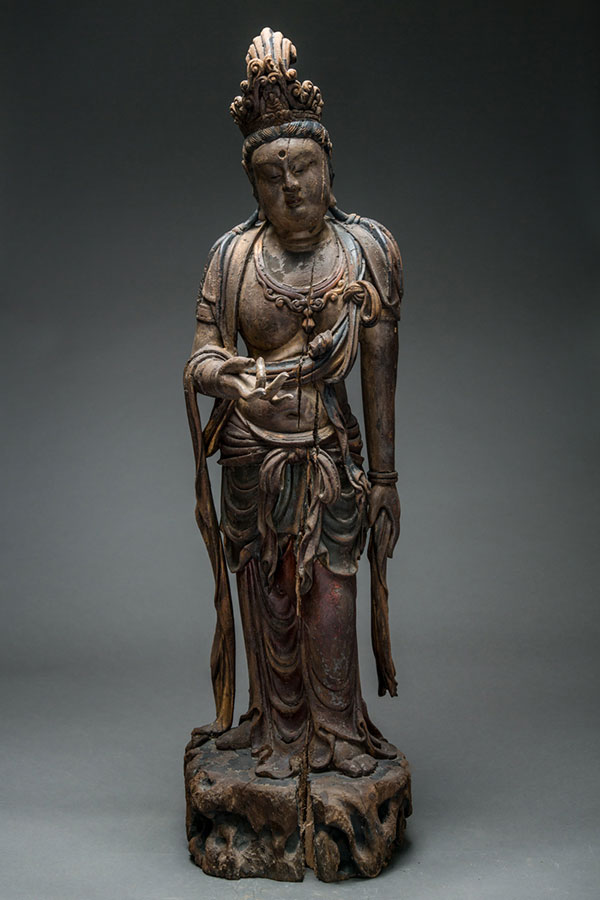Bodhisattvas are enlightened beings who have put off entering paradise in order to help others attain enlightenment. There are many different Bodhisattvas, but the most famous in China is Avalokitesvara, known in Chinese as Guanyin. Early depictions of Bodhisattva Avalokitesvara displayed male characteristics, but this tradition subsequently became less rigid. By the end of the Yuan Dynasty (AD 1367/8), most Guanyin sculptures depicted the beings as young women, often bearing a vase of holy water to cleanse the souls of those they were bound to protect. According to legend, Guanyin was born on the nineteenth of the second lunar month, achieved enlightenment on the nineteenth of the sixth lunar month and achieved nirvana on the nineteenth of the ninth lunar month. It is said that s/he is the top Bodhisattva beside Shakyamuni Buddha, and an assistant Bodhisattva beside Amitabha Buddha in the Western World of Ultimate Bliss. It is believed that any sentient being who recites his/her name during a disaster would be heard and saved, which can explain why his/her importance to Chinese Buddhism. "Guanyin" literally means "observing the sounds", which refers to the belief that the Guanyin would observe all the sounds in the world, particularly listening for requests from worshippers.
The current example is female, and stands 39" tall on an incorporated base. The pose is somewhat langurous, with the weight shifted onto the right leg while the left is slightly bent. The left hand hangs by the side, holding some implement or piece of drapery. The right hand is raised, and appears to be an object of contemplation by Guanyin. The head is carved in a mood of reflective serenity, and is inclined slightly to the right. The sculpture is topped with a tall, ornate crown of generally floral aspect, with plume-like eminences arranged in vertically-oriented bunches. The underlying hair has been gathered up underneath the crown, leaving a halo of hair around its perimeter. A loose tunic-like garment (dhoti) envelops the lower half of the body, and further drapery (scarves) is casually wrapped over the shoulders. The complexity of the drapery and the care with which it has been carved is stunning - the individual folds and creases are all cleanly and deftly rendered, and contrast with the smooth texture of the skin. The figure additionally wears two bracelets on the left wrist, as well as a necklace and pendant arrangement in the chest area. This is a superb and important sculpture that would grace any collection of Eastern art.
For more information on this example click the image above. To browse additional
selections CLICK HERE Barakat GalleryMing Dynasty Lacquered Wood Sculpture of Guanyin
The Barakat Gallery, 421 North Rodeo Drive,
Beverly Hills, CA 90210
| London: 58 Brook Street, Mayfair, London +442074937778 Beverly Hills: 421 North Rodeo Drive, Beverly Hills, California +14242395840 Seoul: 58-4, Samcheong-ro, Jongno-gu, South Korea +821034973413 West Hollywood: 941 N La Cienega Blvd. Los Angeles CA 90069 +13108598408 Hong Kong: 68 C Hollywood Road Kelford Mansion. Sheung Wan.Tel.00852-26382005 21 Wong Chuk Hang Road Global Trade Square 1901Wong Chuk Hang-Aberdeen Tel.00852-26382191 |



